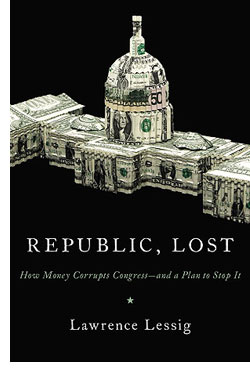 |
 |

Lawrence Lessig
Republic, Lost: How Money Corrupts Congress—and a Plan to Stop It
Reviewed by: Rick Kleffel © 2009
Twelve Books / Grand Central / Hachette Book Groupe
US Hardcover First Edition
ISBN 978-0-446-57643-7
Publication Date: 10-05-2011
384 Pages; $26.99
Date Reviewed: 11-03-2011
Index:
Non-Fiction
Addressing the problems that plague America's government and politics is a task both obvious and impossible. There are so many visible ills that even cataloguing them begins to seem hopeless, coming up with solutions unimaginable, and implementing change hopeless. This does not stop a veritable army from writing books that range in outlook from Pollyanna-esque to Apocalyptic. No matter what the perspective, the tone of these tomes is dishearteningly similar. The sound of axe-grinding threatens to deafen the audience.
The first victory, then, of 'Republic, Lost' by Harvard Law scholar Lawrence Lessig, is his prose. It's hard to pin down, but immediately noticeable. Soon, as Lessig explores the literature and history of economy, power and politics, it becomes clear. He lets his readers join him in a journey to understanding. He works out the ideas for himself and lets readers come along for the ride. 'Republic, Lost' works as a reading experience precisely because it lives up to its title. Yes, we have lost our way, and the Republic itself is at risk. But as Lessig examines both the perception and exercise of political power, both the author and the reader begin to understand the source of the problem. With understanding, a solution becomes possible — but not easy.
Lessig's analysis of American politics began with his work on the laws as they regard the Internet. He found that though there were clearly two sides to the legal arguments about copyright infringement, only one side was visible to Congress — the one with money. In 'Republic, Lost,' he follows up on this idea and analyzes not just the effect of money in how laws are passed, but the perception of the effect of money. He looks at the intentions of the Constitution, and concludes that money has corrupted not the people but the setup of the governmental system itself. We are not the victims of evil individuals, though there are more than a few haunting the hallways. American government and liberty are the victims of a system that by necessity runs on money. The huge amounts required to both live a life and run a campaign distort the intentions of all involved, in the same way that gravity bends light.
Lessig is himself an academic, and the studies he cites to support his conclusions are academic as well. He needs the facts to make his case, and he uses them. The triumph here is that Lessig's prose style is conversational but never condescending. It's really enjoyable to join him on his journey, and he is not hesitant to address the reader directly. At one point he tells the reader that his book is not of a particular type, and that if the reader wants that book, the reader is welcome to write it him or her self. It's a risky strategy that pays off. We trust Lessig, who seems authentically non-partisan. He even has chapters that show how the problems inherent in our current system of elections harm both parties.
The outlook he has is grim, but not without hope. Understanding the problem, which Lessig explains with clarity, requires a nuanced perception. And once you understand the problem, a solution becomes possible, though not easy. Like many writers in the political vein, he presents potential solutions. The difference here is that he keeps the reader along with him for the ride. He acknowledges difficulty without succumbing to pessimism. The amount of hope you can carve out of this book is proportional to the amount of work you're willing to do.
In the interim, just reading this book will give you hope. Lessig's writing is a breath of fresh air. The works he cites come from all stripes of the political spectrum, and one can guess that they too are worth one's valuable reading time. The problems in our political landscape are not just loud. They thrive on their own volume and excess. Talking heads are more and more difficult to find. Most of them seem to be shouting. Lawrence Lessig's calm style stands out. 'Republic, Lost' clearly identifies the subtle problems that underlie the obvious disaster, and offers possible solutions to a seemingly impossible predicament. With entertaining conversational prose, Lessig defeats the language of an army of lawyers and lobbyists.
|
 |
|
|
 |
| |
Review Archive
All Reviews alphabetized by author.
General Fiction
Non-Genre, general fiction and literature.
Horror
Supernatural fiction, supernatural horror and non-supernatural horror.
Science Fiction
Science fiction, science fantasy, speculative fiction, alternate history.
Fantasy
Fantasy, surrealism and magic realism.
Mystery
Crime, thrillers, mystery, suspense.
Non-Fiction
Non-Fiction, True Crime, Forteana, Reference.
Poetry
|
|
 |
|




